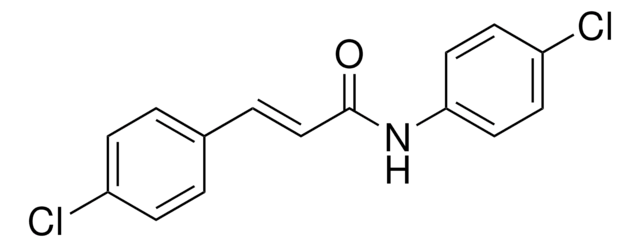A2917
Acrylamide/Bis-acrylamide
for molecular biology, BioReagent, 19:1 (ratio)
Synonym(s):
Acrylamide/Bisacrylamide, 19:1 (5% crosslinker), Polyacrylamide solution
About This Item
Recommended Products
grade
for molecular biology
product line
BioReagent
form
powder
feed ratio
19:1 (ratio)
foreign activity
DNAse (exonuclease), NICKase (endonuclease), RNAse, and protease, none detected
SMILES string
NC(=O)C=C.C=CC(=O)NCNC(=O)C=C
InChI
1S/C7H10N2O2.C3H5NO/c1-3-6(10)8-5-9-7(11)4-2;1-2-3(4)5/h3-4H,1-2,5H2,(H,8,10)(H,9,11);2H,1H2,(H2,4,5)
InChI key
OCQZXMCGTAWGEQ-UHFFFAOYSA-N
Looking for similar products? Visit Product Comparison Guide
General description
Application
- in the preparation of urea polyacrylamide gel during a modified cross-linking affinity purification protocol (cCLAP)
- in microsatellite genotyping and nonfluorescent elastin (ELN) (GT)n polymorphism genotyping
- in polyacrylamide gel for separation of proteins in SDS-PAGE for western blotting
Features and Benefits
Reconstitution
For the 1 Liter size, use 630 mL of water.
Signal Word
Danger
Hazard Statements
Precautionary Statements
Hazard Classifications
Acute Tox. 3 Oral - Acute Tox. 4 Dermal - Acute Tox. 4 Inhalation - Carc. 1B - Eye Irrit. 2 - Muta. 1B - Repr. 2 - Skin Irrit. 2 - Skin Sens. 1 - STOT RE 1 Oral
Target Organs
Peripheral nervous system
Storage Class Code
6.1C - Combustible acute toxic Cat.3 / toxic compounds or compounds which causing chronic effects
WGK
WGK 3
Flash Point(F)
Not applicable
Flash Point(C)
Not applicable
Personal Protective Equipment
Certificates of Analysis (COA)
Search for Certificates of Analysis (COA) by entering the products Lot/Batch Number. Lot and Batch Numbers can be found on a product’s label following the words ‘Lot’ or ‘Batch’.
Already Own This Product?
Find documentation for the products that you have recently purchased in the Document Library.
Customers Also Viewed
Our team of scientists has experience in all areas of research including Life Science, Material Science, Chemical Synthesis, Chromatography, Analytical and many others.
Contact Technical Service







